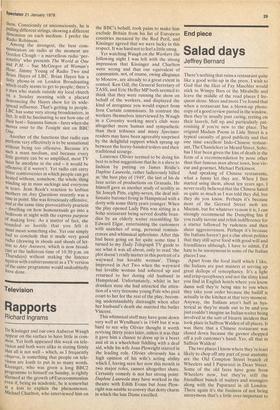Television
Rapports
Richard Ingranns
Dr Kissinger and our own Auberon Waugh appear on the surface to have little in common. Yet both appeared this week on television and both were alike in stating firmly that all is not well — which, as I frequently observe, is something that people on television are loath to put in so many words. Kissinger, who was given a long BBC2 Programme to himself on Sunday, is rightly alarmed at the growth of Eurocommunism even if, being an academic, he is somewhat at a loss to explain the phenomenon. Michael Charlton, who interviewed him on
the BBC's behalf, took pains to make him exclude Britain from his list of European countries menaced by the Red Peril, and Kissinger agreed that we were lucky in this respect. It was hard not to feel a little smug.
Yet watching Waugh on the Workers the following night I was left with the strong impression that Kissinger and Charlton were wrong and that our equivalent of communists, not, of course, owing allegiance to Moscow, are already to a great extent in control. Ken Gill, the General Secretary of TASS, and Eric Heifer MP both seemed to think that they were running the show on behalf of the workers, and displayed the kind of arrogance you would expect from Iron Curtain commissars. In contrast the workers themselves interviewed by Waugh in a Coventry working men's club were altogether more human and sympathetic than their tribunes and many Spectator readers may have been agreeably surprised by the delightful rapport which sprang up between the horny-handed toilers and their traditional scourge.
Laurence Olivier seemed to be doing his best to rebut suggestions that he is a slave to fashion by putting on James Bridie's Daphne Laureola, rather ludicrously billed as 'the best play of 1949', the list of his de luxe series of productions on Granada. He himself gave us another study of senility as Sir Joseph Pitts, eighty-seven, the deaf millionaire baronet living in Hampstead with a dotty wife some thirty years younger. When the play opened Lady Pitts was sitting in a Soho restaurant being served double brandies by an elderly waiter resembling Sir Edward Eiger, entertaining the customers with snatches of song, personal reminiscences and whimsical aphorisms. After this had been going on for quite some time I turned to my Daily Telegraph TV guide to see what it was all about, only to read 'the plot doesn't really matter in this portrait of a wayward but lovable woman'. Things improved in Act Two when the wayward but lovable woman had sobered up and returned to her doting old husband in Hampstead. Unfortunately, whilst in her drunken state she had attracted the attention of a very tiresome young Pole who paid court to her for the rest of the play, becoming understandably distraught when after her husband's death she married the butler Vincent.
This whimsical stuff may have gone down very well at Wyndham's in 1949 but it was hard to see why Olivier thought it worth reviving thirty years later, unless it was that it gave him a chance to dress up in a beret and sit in a wheelchair fiddling with a deaf aid, while his wife Joan Plowright starred in the leading role. Olivier obviously has a high opinion of his wife's acting ability which I, having seen her now this month in two major roles, cannot altogether share. Certainly comedy is not her strong point. Daphne Laureola may have worked in the theatre with Edith Evans but Joan Plowright was unable to convey that dotty charm in which the late Dame excelled.


































 Previous page
Previous page